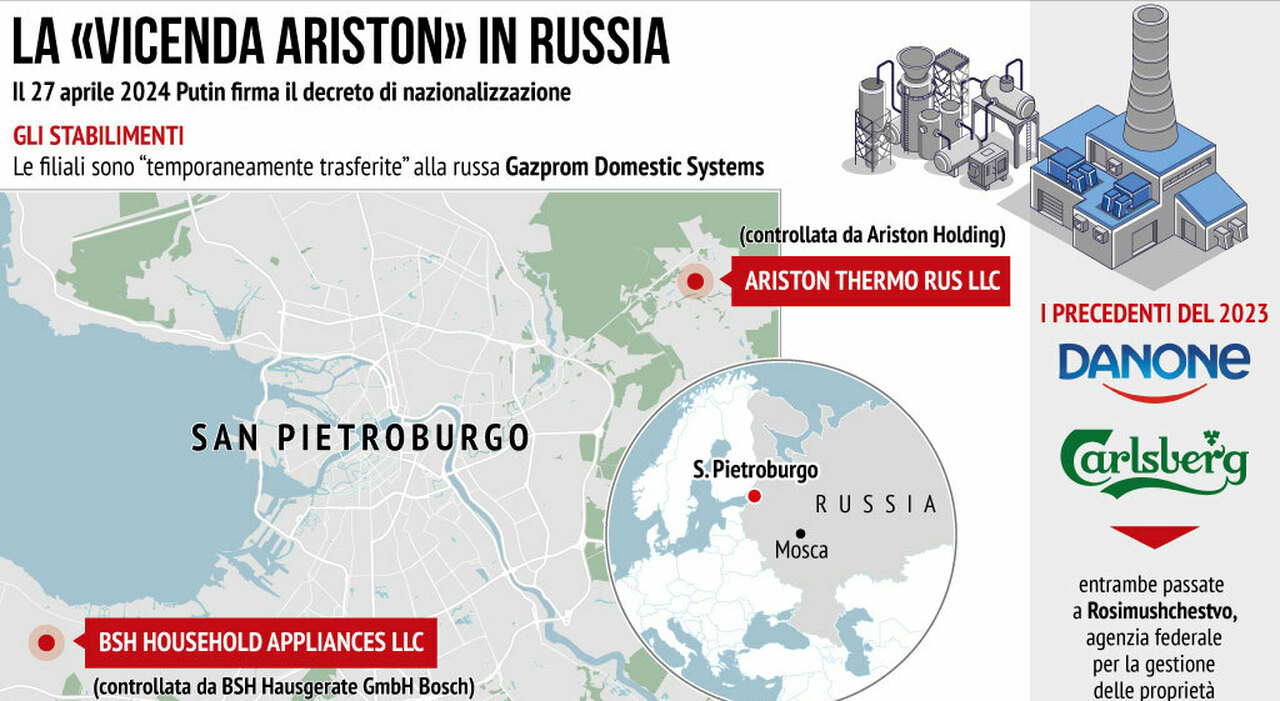Between Italy and Russia, the Ariston case still dominates the scene. Following Tajani's announcement on Saturday, today the Russian ambassador to Italy, Alexei Paramonov, was received at the Farnesina by Secretary-General Riccardo Guariglia. The summoning of the diplomat had been announced by the Foreign Minister to seek clarification on the matter of the nationalization of the Ariston Thermo Group.
The Italian Government's Disappointment
The Secretary-General of the Farnesina, Riccardo Guariglia, "expressed the strong disappointment of the Italian Government" to the Russian ambassador Paramonov, who was summoned to the ministry in relation to the temporary administration transfer of Ariston Thermo Rus, a company belonging to the Ariston Group, to a Gazprom group company, a decree that also affected a German company. "In line with European partners, and in particular with Germany - the Farnesina states - Italy asks the Russian Federation to withdraw the measures taken against legitimate economic activities of foreign companies in the country".
Moscow nationalizes Ariston, government and EU take action. Merloni: "We are disheartened"
The Ariston Case
"Ambassador Guariglia expressed the strong disappointment of the Italian Government for such an unexpected measure and asked Ambassador Alexey Paramonov for clarifications on its motivations, which find no basis in law, especially considering that it was adopted against a company that has a historical presence in the country and has no connection with the current international crisis situation. He also expressed to his interlocutor the hope that Russia could reconsider the measure taken, being itself qualified by the Russian side as temporary," adds the note from the Farnesina. "The European Union, with its own statement, strongly condemned the measure in question yesterday, which also affected a German company, noting, among other things, that it represents further proof of Russia's lack of respect for international law. The Vice President of the Council and Minister of Foreign Affairs Antonio Tajani has been in contact from the first moment with the company and reserves the right to explore the consequences of the Russian decision together with G7 and EU partners and to evaluate an appropriate response. In line with European partners, and in particular with Germany, Italy asks the Russian Federation to withdraw the measures taken against legitimate economic activities of foreign companies in the country. The competent structures of the MAECI, in particular the General Directorate for the Country System, continue to follow and monitor the situation, in close coordination with our embassy in Moscow and our permanent representation to the EU," concludes the Farnesina.
Moscow Defends the Decision and Attacks Rome
The Russian ambassador Paramonov provided "exhaustive explanations on the legality and foundation of the decisions taken," writes the embassy. Paramonov, the embassy emphasizes, "reminded the interlocutors that Moscow has always attached particular importance to the fruitful and mutually beneficial commercial and economic relations with Italy. The responsibility for the negative consequences of their deterioration lies entirely with the Italian authorities who have sacrificed the real national interests to participate in sterile and dangerous anti-Russian adventures". "On April 29, 2024, Alexey Paramonov, ambassador of the Russian Federation to Italy, was summoned to the Ministry of Foreign Affairs of the Italian Republic regarding the 100% share capital of Ariston Thermo Rus LLC (city of Vsevolzhsk, Leningrad province), owned by the parent company Ariston Holding N.V. (Netherlands), which was transferred to temporary management to JSC Gazprom Household Systems (a Gazprom subsidiary)," reads a note from the Russian embassy published on social channels.
"From the Russian Federation's side - the note continues - exhaustive explanations were provided on the legality and foundation of the decisions taken regarding a company that, de jure, is Dutch. It was emphasized that these measures, in accordance with the relevant legal framework, were adopted in response to hostile actions and contrary to international law undertaken by the United States of America and other foreign States that joined them, aimed at illegally depriving Russia, its legal entities, and various individuals of the right to property and/or to limit such right on assets located in the territory of such States," continues the note. "One cannot ignore that the rhetoric and increasingly aggressive and irresponsible tone of Western leaders and their teams can only be interpreted as a deliberate intention to continuously threaten the security of the Russian Federation, national, economic, energy, and of any other type. The ambassador of the Russian Federation reminded the interlocutors that Moscow has always attached particular importance to the fruitful and mutually beneficial commercial and economic relations with Italy. The responsibility for the negative consequences of their deterioration lies entirely with the Italian authorities who have sacrificed the real national interests of the Republic to participate in sterile and dangerous geopolitical adventures against Russia," concludes the note from the embassy.
Tajani Convenes "Russia Table" on Thursday
The Vice President of the Council and Minister of Foreign Affairs Antonio Tajani has convened a "Russia table" for Thursday, May 2, to continue monitoring the latest decisions taken by Moscow on the activities of Italian companies in Russia. The table will be attended by the Secretary-General of the Farnesina Riccardo Guariglia along with representatives of Confindustria, the business world, and associations, with the executives of the ministries involved. On Saturday, Tajani asked the Farnesina to initiate a consultation at the EU level to include companies affected by Russian retaliations in European compensation programs.
This article is automatically translated
